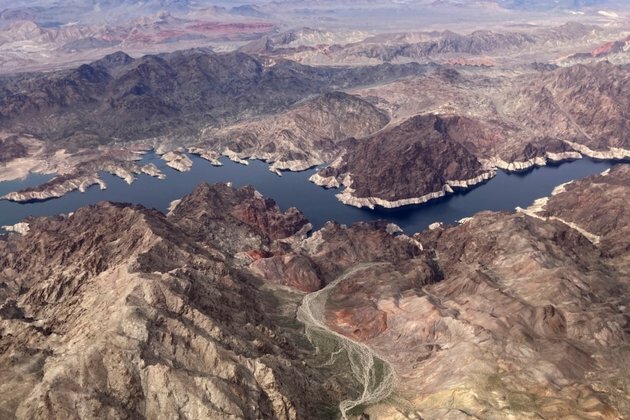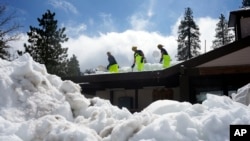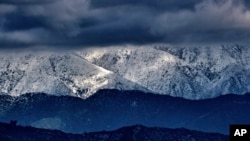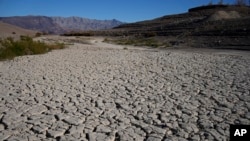Scientists: Largest US Reservoirs Moving in Right Direction
Voice of America
16 Mar 2023, 19:05 GMT+10

ALBUQUERQUE, N.M. - Parts of California are under water, the Rocky Mountains are bracing for more snow, flood warnings are in place in Nevada, and water is being released from some Arizona reservoirs to make room for an expected bountiful spring runoff.
All the moisture has helped alleviate dry conditions in many parts of the western U.S. Even major reservoirs on the Colorado River are trending in the right direction.
But climate experts caution that the favorable drought maps represent only a blip on the radar as the long-term effects of a stubborn drought persist.
Groundwater and reservoir storage levels - which take much longer to bounce back - remain at historic lows. It could be more than a year before the extra moisture has an effect on the shoreline at Lake Mead that straddles Arizona and Nevada. And it's unlikely that water managers will have enough wiggle room to wind back the clock on proposals for limiting water use.
That's because water release and retention operations for the massive reservoir and its upstream sibling - Lake Powell on the Utah-Arizona border - already are set for the year. The reservoirs are used to manage Colorado River water deliveries to 40 million people in seven U.S. states and Mexico.
Still, Lake Powell could gain 45 feet (14 meters) as snow melts and makes its way into tributaries and rivers over the next three months. How much it rises will depend on soil moisture levels, future precipitation, temperatures and evaporation losses.
'We're definitely going in the right direction, but we still have a long way to go,' said Paul Miller, a hydrologist with the National Weather Service's Colorado Basin River Forecast Center.
Federal forecasters are scheduled Thursday to roll out predictions for temperature, precipitation and drought over the next three months, as well as the risk for springtime flooding.
California already has been drenched by a fire hose of moisture from the Pacific Ocean that has led to flooding, landslides and toppled trees.

Ski resorts on the California-Nevada border are marking their snowiest winter stretch since 1971, when record-keeping began. In fact, the Sierra Nevada is on the verge of surpassing the second-highest snow total for an entire winter season, with at least two months still to go.
In Arizona, forecasters warned that heavy rain was expected to fall on primed snowpack in the mountains above the desert enclave of Sedona. One of the main creeks running through the tourist town was expected to reach the flood stage and evacuations were ordered for some neighborhoods late Wednesday.
'We've pretty much blown past all kinds of averages and normals in the Lower Colorado Basin,' Miller said, not unlike other western basins.

Forecasters say the real standout has been the Great Basin, which stretches from the Sierra Nevada to the Wasatch Mountains in Utah. It has recorded more snow this season than the last two seasons combined. Joel Lisonbee, with the National Integrated Drought Information System, said that's notable given that over the last decade, only two years - 2017 and 2019 - had snowpack above the median.
Overall, the West has been more dry than wet for more than 20 years, and many areas will still feel the consequences.

An emergency declaration in Oregon warns of higher risks for water shortages and wildfires in the central part of the state. Pockets of central Utah, southeastern Colorado and eastern New Mexico are still dealing with extreme drought, while parts of Texas and the Midwest have become drier.
Forecasters are expecting warm, dry weather to kick in over the coming weeks, meaning drought will keep its foothold in some areas and tighten its grip elsewhere.
Tony Caligiuri, president of the preservation group Colorado Open Lands, said all the recent precipitation shouldn't derail work to recharge groundwater supplies.
'The problem or the danger in these episodic wet year events is that it can reduce the feeling of urgency to address the longer-term issues of water usage and water conservation,' he said.
The group is experimenting in the San Luis Valley in southern Colorado, the headwaters of the Rio Grande. One of North America's longest rivers, the Rio Grande and its reservoirs have been struggling due to meager snowpack, long-term drought and constant demands. It went dry over the summer in Albuquerque, and managers had no extra water to supplement flows.
Colorado Open Lands reached an agreement with a farmer to retire his land and stop irrigating the about 1,000 acres. Caligiuri said the idea is to take a major straw out of the aquifer, which will enable the savings to sustain other farms in the district so they no longer face the threat of having to turn off their wells.
'We've seen where we can have multiple good years in place like the San Luis Valley when it comes to rainfall or snowpack and then one drought year can erase a decade of progress,' he said. 'So you just can't stick your head in the sand just because you're having one good wet year.'
 Share
Share
 Tweet
Tweet
 Share
Share
 Flip
Flip
 Email
Email
Watch latest videos
Subscribe and Follow
Get a daily dose of Albuquerque Express news through our daily email, its complimentary and keeps you fully up to date with world and business news as well.
News RELEASES
Publish news of your business, community or sports group, personnel appointments, major event and more by submitting a news release to Albuquerque Express.
More InformationInternational
SectionEU probes Visa, Mastercard fees amid antitrust scrutiny
BRUSSELS, Belgium: European Union antitrust regulators are examining fees imposed by payment giants Visa and Mastercard, Bloomberg...
US Army to list only birth sex in transgender soldiers' records
WASHINGTON, D.C.: The U.S. Army plans to change the records of transgender soldiers to list only their sex at birth, according to a...
US FAA orders flight reductions at Newark Airport to ease congestion
WASHINGTON, D.C.: The Federal Aviation Administration (FAA) said this week that it will require airlines to reduce the number of flights...
Nine children from 1 family die as Israel Air force pilots hit 100 targets in Gaza
GAZA - The home of a doctor working in the emergency room at the Nasser Medical Complex in southern Gaza was struck by Israel Air...
Universal unveils Epic Universe to challenge Disney’s dominance
ORLANDO, Florida: For years, Universal Orlando played second fiddle to Disney's sprawling empire in Central Florida. Now, with the...
Biden-era fuel rules face pushback over EV inclusion
WASHINGTON, D.C.: The U.S. Transportation Department is expected to say that fuel economy rules created under President Joe Biden went...
Business
SectionCEO says health push weakened Nestle, vows return to F&B roots
VEVEY, Switzerland: Nestle is realigning its focus on its core food and beverage operations after expanding into areas like health...
Ford sues California law firms over alleged Lemon Law fee fraud
DEARBORN, Michigan: Ford Motor Company has filed a lawsuit against several California lawyers and law firms, accusing them of cheating...
US drug launch prices double in four years, Reuters finds
BRUSSELS, Belgium: U.S. drugmakers are charging significantly more for new treatments, particularly those targeting rare diseases,...
Allegations of secret nursing home deals shake UnitedHealth
MINNETONKA, Minnesota: UnitedHealth shares took a sharp hit this week, after a report by the UK's Guardian alleged the healthcare giant...
Trump-backed $1.5 billion golf project breaks ground near Hanoi
HUNG YEN, Vietnam: A new US$1.5 billion luxury golf and residential project backed by the Trump Organization officially broke ground...
Aussie firms upbeat on China outlook despite trade tensions
SYDNEY, Australia: Australian businesses are feeling optimistic about their prospects in China despite escalating global trade tensions,...













